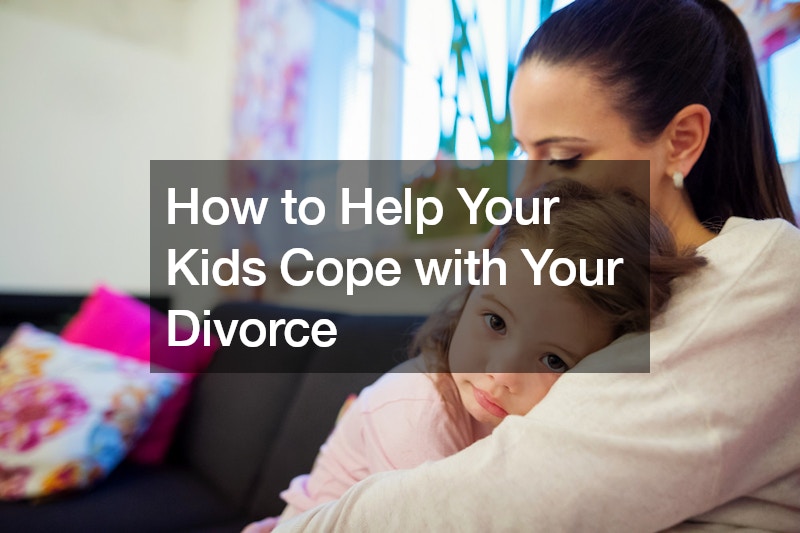Divorce is a challenging experience for everyone involved, but children can be particularly vulnerable to the changes and stress that accompany it. As a parent, it’s crucial to provide the support and guidance your kids need to navigate this difficult time. Here are some practical steps to help your children cope with your divorce:
Minimize Conflict
One of the most significant factors affecting children during a divorce is the level of conflict between parents. High levels of tension and disagreement can exacerbate the emotional stress on kids. To mitigate this, try to handle disputes calmly and privately, away from your children.
Consider working with divorce lawyers to ensure the process is as smooth and amicable as possible. A professional can help mediate discussions and reduce contentious interactions.
- Agree on Rules for Disagreements: Establish rules with your ex-spouse for managing disagreements, such as no yelling, no name-calling, and no discussing issues in front of the children.
- Use Written Communication: If verbal communication tends to escalate, consider communicating through email or text for logistical matters.
- Seek Mediation: Use a mediator provided by your divorce lawyer to resolve disputes and keep interactions civil.
Encourage Open Communication
Giving your children a safe space to express their feelings is essential. Encourage them to talk about their emotions, whether they are angry, sad, confused, or anxious.
Specific Tips:
- Regular Check-Ins: Set aside time each day, such as during dinner or before bed, to ask your child, “How are you feeling today?” or “Is there anything on your mind that you want to talk about?”
- Active Listening: When your child shares their feelings, listen attentively without interrupting. Use phrases like, “I understand that you’re feeling upset,” or “It’s okay to feel sad about the changes happening.”
- Validate Their Emotions: Acknowledge their feelings by saying, “It’s completely normal to feel this way,” or “I’m here for you, no matter what you’re feeling.”
If they are reluctant to open up to you, consider involving a therapist who specializes in helping children through divorce. Professional guidance can provide your child with tools to manage their emotions effectively.
Monitor Changes in Behavior
Children often express their distress through changes in behavior rather than words. Pay close attention to shifts in their routine and demeanor.
- Keep a Behavior Journal: Track changes in your child’s sleeping patterns, eating habits, and social interactions. Note any significant deviations from their usual behavior.
- Discuss Observations: If you notice changes, gently bring them up by saying, “I’ve noticed you haven’t been sleeping well lately. Is there something on your mind?” or “You seem quieter than usual. Do you want to talk about it?”
- Consult Professionals: If changes persist for weeks or months, consult your child’s pediatrician or a therapist. You might say, “I think it could help to talk to someone who can give us more ways to manage these feelings.”
Maintain Consistency and Routine
Stability is key for children during times of upheaval. Try to maintain a consistent routine to provide a sense of normalcy.
- Regular Meal and Bedtimes: Stick to regular meal times and bedtimes. For example, ensure dinner is at 6 PM and bedtime is at 8 PM every night.
- Weekly Activities: Continue with weekly activities, like family game nights on Fridays or Saturday morning sports practice.
- Shared Parenting Schedule: Develop a consistent parenting schedule. For instance, if your child spends weekdays with you and weekends with your ex-spouse, stick to this arrangement to provide predictability.
Reassure and Affirm Your Love
Children may fear that the divorce is their fault or that they will lose the love of one or both parents. Regularly reassure them that they are loved and that the divorce is not their fault.
- Verbal Reassurance: Frequently tell your child, “I love you very much, and that will never change,” and “The divorce is not your fault; it’s a decision between adults.”
- Physical Affection: Show affection through hugs, kisses, and spending quality time together.
- Quality Time: Plan regular one-on-one time with each child, such as going for a walk, cooking together, or reading a book before bed.
Seek Professional Guidance
Divorce can be complex, and navigating it effectively often requires professional help. In addition to a divorce lawyer, consider engaging a family therapist who can work with you and your children to address emotional and psychological needs.
- Therapy Sessions: Schedule regular family therapy sessions to provide a safe space for everyone to express their feelings and learn coping strategies.
-
Workshops and Support Groups: Look for workshops or support groups for children of divorced parents. These can offer peer support and additional coping tools.
Helping your kids cope with divorce involves minimizing conflict, encouraging open communication, monitoring behavior changes, maintaining consistency, and seeking professional support. By focusing on these areas, you can create a supportive environment that helps your children adjust to the changes and continue to thrive. Remember, your love and attention are the most critical resources your children need during this challenging time.
.

